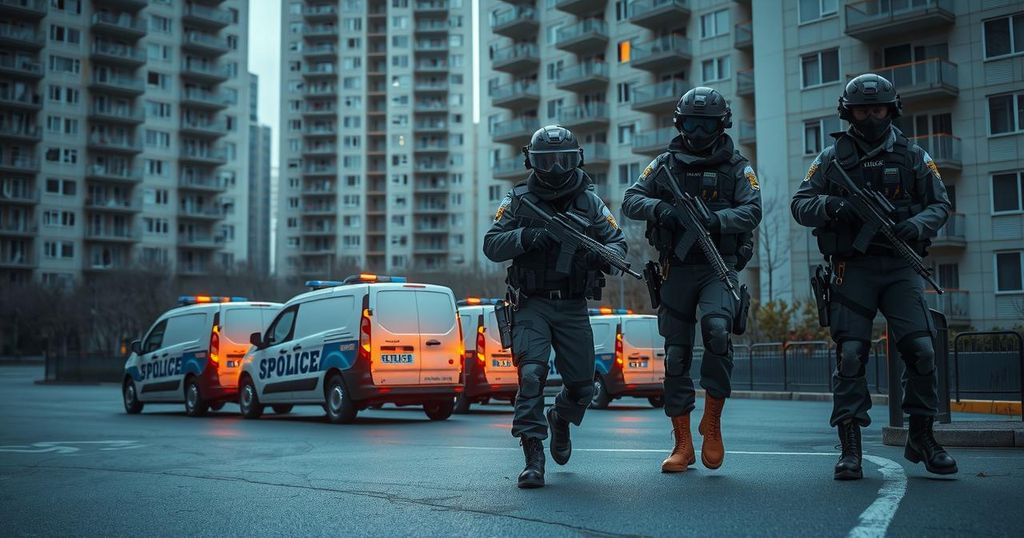Crime
AFRICA, ARREST, ARRESTS, AURORA APARTMENTS, BEN PETERS, BENEDICT PETERS, CHARGE OF SPECIAL OPERATIONS, CRIME, GBANDE, GHANA, GHANA ARMED FORCES, GHANA POLICE SERVICE, GREATER ACCRA, GREATER ACCRA REGIONAL CID, JUBILEE HOUSE, JUSTICE, KANDA, KIDNAPPING, LAW ENFORCEMENT, MUST, MUSTAPHA GBANDE, NATIONAL SECURITY OPERATIVES, NATIONAL SECURITY SECRETARIAT, OFFICE OF THE PRESIDENT, PETERS, RICHARD JAKPA
Elena Martinez
0 Comments
Arrest of Nigerian Tycoon Ben Peters: What We Know So Far
Benedict Peters, a Nigerian businessman in Ghana, was arrested alongside 25 others for blocking a road at the Aurora Apartments. The operation involved National Security and police forces and was led by Richard Jakpa and Mustapha Gbande. Allegations against him include illegal road blockage, unauthorized use of police sirens, operating an unapproved security agency, and possessing unregistered vehicles. The case has sparked debate due to conflicting media reports and the involvement of high-profile individuals.
Benedict Peters, a Ghana-based Nigerian businessman, was reportedly arrested alongside approximately 25 others at the Aurora Apartments in Kanda, near the Jubilee House. The operation was led by the Director in Charge of Special Operations at the National Security Secretariat, Richard Jakpa, and the Deputy Director of Operations at the Office of the President, Mustapha Gbande. Following his arrest, Peters was taken to the Greater Accra Regional CID for further questioning.
The alleged crimes of Mr. Peters include blocking a road by using his vehicles and armed men to prevent access to other residents of the apartment complex. Mustapha Gbande stated that this incident occurred after Peters reportedly blocked the entrance due to a dispute over keys to the rooms. Gbande emphasized that such actions are against the law.
Furthermore, several vehicles owned by Peters were reportedly equipped with police sirens. Under Ghanaian law, only specific types of vehicles, such as those belonging to governmental officials or recognized security agencies, are permitted to use sirens. Peters purportedly possessed multiple vehicles with unauthorized sirens and floodlights.
Additional accusations include operating an unauthorised private security agency, which requires approval from the Minister of the Interior in Ghana. Gbande also claimed that Peters maintained around 20 unregistered vehicles, and a police motorcade was found without a license plate.
The incident escalated when security officers attempted to diffuse the situation, but they faced threats of gunfire from Peters’ security personnel. This prompted the National Security to intervene, as tensions rose near the seat of government. Gbande reported that Peters’ security officials, dressed in black suits, numbered between 60 and 70 at the scene.
Reports indicated that Peters initially resisted arrest during a standoff with security operatives until Ghanaian businessman, Ibrahim Mahama, intervened. Meanwhile, some Nigerian media claimed that Peters had not been arrested, stating that he had only protested peacefully due to access issues and had cooperated with authorities when summoned. There were assertions that the situation was misrepresented, characterized instead as a routine traffic issue instead of an arrest.
Despite conflicting accounts, footage emerged of the arrest, showing confrontations between Peters’ security personnel and law enforcement officers at the scene. Videos displayed the robust presence of police vehicles and involved individuals, leading to questions about the nature of the incident and arrest. This event has drawn considerable attention and scrutiny from both Ghanaian and Nigerian media outlets, highlighting a complex interplay of law enforcement and individual rights in Ghana.
In conclusion, the arrest of Nigerian businessman Benedict Peters has raised several crucial issues surrounding legality and authority in Ghana. His alleged actions of blocking access to an apartment complex, operating vehicles with unauthorized sirens, and running an unlicensed security agency have contributed to a contentious situation that required significant intervention from national security forces. The situation remains under scrutiny as conflicting accounts surface from both Ghanaian and Nigerian media, emphasizing the complexity of law enforcement in such high-profile cases.
Original Source: www.ghanaweb.com




Post Comment